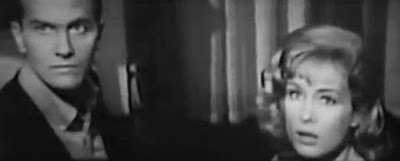 |
| Wickes, Goddard, Crawford, and a sleeping Homolka |
ANNA LUCASTA (1949), Director: Irving Rapper.
The Lucasta family of Mayberry, PA. consists of daughter Stella (Mary Wickes); her husband, Frank (Broderick Crawford); her brother, Stanley (Whit Bissell); his wife, Katie (Gale Page); the mother, Theresa (Lisa Golm); and her husband, Joe (Oscar Homolka), a rather nasty alcoholic. When Frank discovers that Rudolf Strobel (William Bishop), the son of Joe's old friend, is coming to town to look for a wife and has money to burn, he and Stella come up with the idea of marrying him off to Stella's sister, Anna (Paulette Goddard), who was thrown out of the house because of a simple kiss with a date. Joe is violently importuned to go to Brooklyn to get his daughter back to Pennsylvania, so she leaves her sort-of boyfriend, sailor Danny (John Ireland), and comes back to the crowded suburban home. Just when things seem to be going well between her and Rudolf, whom she genuinely loves, Danny shows up, and her father shows his daughter just how utterly loathsome he can really be.
Anna Lucasta was based on a play of the same name that was originally about a Polish-American family, but which was turned into a play about a black family before its Broadway debut. (Playwright Philip Yordan, who co-wrote the screenplay with Arthur Laurents, was himself Polish-American). It was inspired by O'Neill's
Anna Christie in many ways. (It also has some similarities to Miller's later
A View from the Bridge.) A London production reinstated the Caucasian family and Paulette Goddard played Anna as she does in the film. Almost a decade after the movie version was released, there was a superior
remake with a black cast starring Eartha Kitt.
This version is more of a comedy-drama than the subsequent film. Goddard offers an okay Hollywood-style performance but she can't compare to Kitt who really lives and feels the part. It is made very clear that Anna has become a streetwalker even in this earlier version. If anything, her father's probably incestuous feelings for his daughter seem more overt than in the remake.
The supporting performances are the film's saving grace. You wouldn't think that Broderick Crawford and Mary Wickes would make a convincing husband and wife, but they sure do. Oscar Homolka is outstanding as the father, and there is fine work from Golm as his long-suffering wife. Gale Page makes a perfect, understanding sister-in-law to Anna. Two smaller roles are also of note: Dennie Moore [
These Glamour Girls] in a marvelous turn as the bar waitress Blanche; and Grayce Hampton doing a wonderful dignified drunk routine as the soused patron, Queenie.
Verdict: Imperfect if interestingly-cast study of a clearly dysfunctional family. **1/2,


































